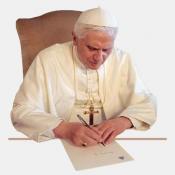Where to find concordats
An extensive and authroitative site, Concordat course material, Pontifical Gregorian University, (March 2013), gives no concordat texts, but does provide much other information (in Italian), including a table of the roughly 200 concordats presently in force listed by country, sources of concordat texts and much more.

♦ Concordat translations on this site listed by country
♦ By region: List of some Latin American concordats
♦ Vatican Secet Archives where the concordats are kept
♦ Why aren't they all called “concordats”?
♦ European church-state sources: online and in books
 |
Secret archives at the Vatican and in each diocese worldwide |
The Vatican points out that the Latin word doesn't necessarily mean "secret — yet it runs its archives as if it did. For more on the Church's troubled relations with the historical record see: | |
 |
Why aren’t they all called “concordats”? |
The “C-word” appears to be avoided, as the Church itself implies, because sometimes it’s politically advisable to pretend that a concordat is something else. | |
 |
Finding concordat texts |
Most concordats are written in two languages. The original is generally in the language of the country concerned, with a translation into Italian, the working language of the Vatican. There are both online concordat collections and also printed volumes of concordats | |
 |
List of some Latin American concordats |
This is an (incomplete) list of Latin American concordats beginning in the later 19th century. The Spanish concordat of 1851 was retained by the American colonies of Spain which later won independence. They wanted to be regarded as successors of the historical and legal obligations of the Spanish crown, so as to retain the right of patronage over the Catholic Church in their territories. | |
 |
European church-state sources: online and in print |














